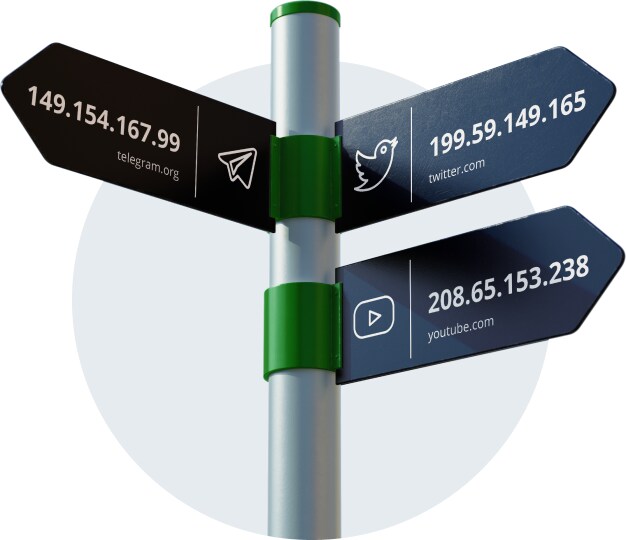- Uygulamaları
- Premium
-
VPN Konumları
-
Yardım
- Kayıt
- Giriş
What is My IP Address?
3.22.77.171
Your online activity is visible to your Internet service provider and anyone else monitoring your actions.
Works in Chrome, Firefox, iOS and Android
Location
Internet service provider (ISP)
What is an IP address?

The Internet Protocol (IP) is a set of rules that ensures the exchange of data packets. Each device or domain connected to the Internet is assigned a certain number that is called the IP address. These numeric labels allow routers to direct data to its destination.
Let’s see how it works:
When you type in a website’s name, a DNS resolver translates the letters into an IP address. Then the system finds it on the web and opens the site in your browser. You can check your IP address by typing: ‘what is my IP’ in any search engine.
Let’s see how it works:
When you type in a website’s name, a DNS resolver translates the letters into an IP address. Then the system finds it on the web and opens the site in your browser. You can check your IP address by typing: ‘what is my IP’ in any search engine.
How to change your IP address
To hide your device from an IP address lookup, you will need a
VPN service.
It masks your real IP by routing traffic through a VPN tunnel.
This makes you invisible to your ISP and anyone else trying to track you.
Changing your current IP helps you keep your data secure. It also gives you access to geographically restricted content, by making it seem like you are located in the same country as the server you’re using.
Changing your current IP helps you keep your data secure. It also gives you access to geographically restricted content, by making it seem like you are located in the same country as the server you’re using.
Works in Chrome, Firefox,
iOS and Android
iOS and Android
Get More Secure
Risk Free Money-Back Guarantee 7-Day
IPv4 vs. IPv6 addresses
There are two major versions of the Internet Protocol: IPv4 and IPv6. They define how an IP address is represented. Both versions are used alongside now to provide a smooth transition from IPv4 to IPv6.
An IPv4 address in dotted-decimal notation
IPv4
IPv4 was introduced in 1981 and is still used by most ISPs. An IPv4 address consists of four numbers separated by dots. For example, 192.1.2.245.
The protocol uses a 32-bit address space that can generate up to 4.3 billion unique IP addresses. However, the number of active devices around the world is increasing every day, and soon they will use up all the possible IPv4 combinations.
The protocol uses a 32-bit address space that can generate up to 4.3 billion unique IP addresses. However, the number of active devices around the world is increasing every day, and soon they will use up all the possible IPv4 combinations.
IPv6
IPv6 was developed in 1995 to help with the approaching IPv4 problem. It uses 128-bit addresses, creating 3.4×1038 unique combinations. An IPv6 address is made up of 8 groups of hexadecimal digits separated by colons. For example, 2091:0da8:85a3:0000:0000:8a2d:0370:7754.
The number can be simplified if blocks consist of only zeroes. Such groups are omitted, and a colon is added instead. For example, 2091:0da8:85a3::8a2d:0370:7754.
The number can be simplified if blocks consist of only zeroes. Such groups are omitted, and a colon is added instead. For example, 2091:0da8:85a3::8a2d:0370:7754.
Public vs. private IP addresses
All IP addresses can be divided into two groups: public and private.
Private IP
Public IP
Internet
Public (or global, or external) IP is the address that accesses the Internet directly. For example, your Wi-Fi router uses a public IP, as well as all the sites and servers on the Internet.
Private (or local, or internal) IP addresses, to the contrary, exist only within a local network. Your computer, laptop, smartphone, and tablet each get a unique private IP when they connect to the router.
Private IP addresses remain hidden while the public ones are exposed to the world wide web.
Private (or local, or internal) IP addresses, to the contrary, exist only within a local network. Your computer, laptop, smartphone, and tablet each get a unique private IP when they connect to the router.
Private IP addresses remain hidden while the public ones are exposed to the world wide web.
What can your IP address reveal about you?
The information your IP address uncovers is used mostly by marketers for target advertising. They create a digital profile based on your browsing history, location, age, and gender.
Where you are
Your IP address shows your country, region, city, postal code, and Internet provider. On the one hand, it helps with showing you more appropriate search results or loading pages in your native language. On the other hand, it is a powerful weapon in the wrongs hands.
Who you are
Your Internet service provider stores information about you: your name, home address, phone number, and credit card details. If cybercriminals find out your IP address, it’s like giving them a key to your house.
What you browse
Your ISP knows everything about your online activity: what sites you visit, what you download, what you search. If you visit sites that are not HTTPS-secured, your provider can even see exactly what pages you open.
Why protect your IP address with Browsec VPN
Hide your location
We have servers in 46 countries for you to choose from. They route your traffic through a secure VPN tunnel disguising your real whereabouts.
Protect your identity
Browsec encrypts your data making it impossible to get access to your personal information and banking operations.
Conceal your browsing history
What you do online is nobody’s business but yours. No one has to know what sites you visit, what torrents you download, what you search and buy.
Works in Chrome, Firefox,
iOS and Android
iOS and Android